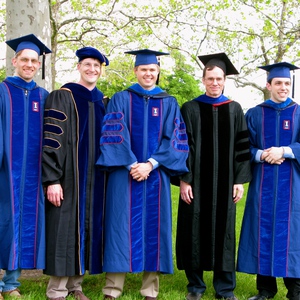PhD in Computer Science in the area of Scientific Computing
About the PhD
Students in the Scientific Computing and Numerical Analysis group receive PhD degrees from the Department of Computer Science at the University of Illinois at Urbana-Champaign.
Are you interested in numerical algorithms? Topics like finite elements, multigrid solvers, integral equations, spectral element methods, fast algorithms, large-scale applications, or high-performance parallell algorithms?
Students in our group pursue research in areas ranging from computation to mathematical theory. We collaborate closely with our colleauges in the numerous excellent engineering departments at Illinois, as well as with the Physical and Social Sciences.
How To Apply: Guidelines and Deadlines
Applicants submit their applications through the Department of Computer Science, which starts with an online application through the Graduate College.- Applications are due in December.
- Letters of Recommendation from someone who works on Scientific Computing, Numerical Analaysis, or High-Performance Computing help us understand how well-prepared you are for a PhD at Illinois.
- Mention your specific interest in Scientific Computing in your Statement of Purpose as well as what particular area you have experience with and may want to do research on. Including this information does not lock you into working in that particular sub-area. Finding your niche takes time, and we understand that. In fact, students can switch (and have switched) to even entirely different groups (such as theory or parallel computing) within the CS department.
- Select "Scientific Computing" as an area of interest when you fill out the Department's interest form.
- In addition, try to identify some faculty whose research sounds interesting!

What To Expect: Curriculum · Connections · Community
The PhD requires 64 or 96 hours of credit, depending on whether you enter with a masters or a bachelors degree. The specific Program of Study (POS) is felxible, but generally our students take Numerical Analysis (CS450), the 500-level courses in our area, and some courses in parallel computing, theory, and engineering. In addition, the Computational Science and Engineering (CSE) Certificate Option is often pursued.
We typically have around 20 graduate students in Scientific Computing (check out our alumni over the last several decades!) Our goal is a fun and positive atmosphere in Scientific Computing to help you take classes, study for the qualifying exam, and collaborate on research toward your PhD.
We maintain close connections with major national and international research centers in numerical analysis and computing. For example, many of our students find it useful to collaborate with scientists at Department of Energy national laboratories such as Lawrence Livermore, Argonne, Sandia, and Los Alamos.
Frequently Asked Questions
- Is funding is guaranteed for Ph.D students?
- If you are admitted to the PhD program, your offer will typically include a promise of funding for a number of years, contingent on passing exams and making adequate progress in your studies.
- I come from an applied mathematics/engineering/science/... background. Will I be at disadvantage in a computer science department?
- No, definitely not. Course prerequisites can be adapted or waived by instructors, and because we have such a strong scientific computing group, our department is used to (and likes having!) students with strong math backgrounds even if they have fewer CS courses.
Interested?
If you want to learn more:- ... visit the SIAM Student Chapter.
- ... dive into our research to see how we spend our time.
- ... take a look at our courses.
- ... apply and visit!